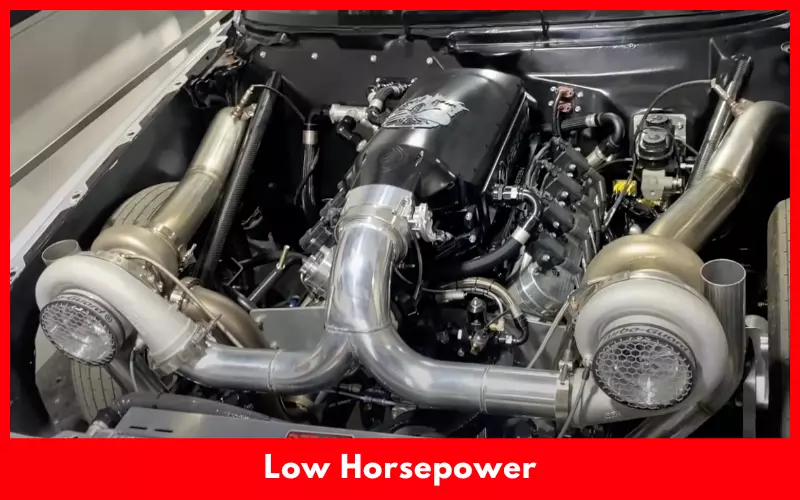Chevy 2.7L turbo engine is top of the trend and replaced the V8 engine, thanks to its compact yet powerful design. However, the Chevy 2.7L turbo engine isn’t beyond the problem that needs attention, and it’s important to consider quality Chevy parts and accessories to maintain its performance and longevity.
Common Chevy 2.7 turbo engine problems are reduced fuel economy, low horsepower, availability issues, and some mechanical problems. However, the owner can easily avoid these problems by taking proper care of the engine and using the right type of oil.
Article Summary
Chevy 2.7 Turbo Engine Problems and Solutions
GM 2.7L turbo engine is a smaller and more fuel-efficient option compared to the older types like the V8 engine. Chevy’s latest volume models such as RST and LT come with this 2.7L turbocharged engine.
Compared to the Chevy 2.7L turbo engine found in Ford F-150, the Chevrolet 2.7 turbo has four cylinders making it a high performer. Still, many Chevy 2.7 turbo users experience various issues and notice that it doesn’t perform as advertised.
Some common complaints about the Chevy 2.7 turbos reported by the owners on various forums and car complaint sources.
1. Reduced Fuel Economy
GM promised that their Chevy 2.7 turbo engine will provide 23 mpg on the highway and 20 mpg on the city. The Chevy 2.7 turbo only provides 19 miles per gallon while driving on city and highway.

It can cost you a large amount of extra money on maintaining the GM vehicle. In this case, you’ll find the other popular brand more economical. For example, the Ford F150 diesel engine provides 25 mpg while Lexus RX 450h engine provides up to 30 mpg.
The signs of bad fuel economy in the Chevy 2.7 turbo include reduced acceleration, backfiring and popping from the exhaust, and a struggle to start the engine. The engine can also lurch or stall at idle and misfire due to poor fuel economy.
However, you can improve the fuel economy of your Chevy 2.7 by preventing its air filter from clogging and keeping oxygen sensors and fuel injectors functional.
2. Low Horsepower
If you prefer a more powerful engine with great mileage, the Chevrolet 2.7 turbo engine might not be the right choice for you. The reason is that the Chevy 2.7 turbo doesn’t provide impressive power.

It can only make 310 HP at 5600 RPM. Though it can be enough for some drivers, power drivers may find it insufficient for their demanding needs.
3. Availability Issues
Many GM owners also complain that it’s difficult to find a Chevy 2.7 turbo engine, particularly after the COVID-19 pandemic.
Despite the low fuel economy and horsepower, the Chevy 2.7 turbo has high demand that the manufacturer can’t fulfill. So you may have to wait for a long time to get your Chevy 2.7 turbo engine replaced.
4. Head Gasket and Timing Belt Issues
In terms of mechanical problems, your Chevy 2.7 turbo engine can cause timing belt and head gasket failure. Some Chevy 2.7 turbo user complains that their timing belts fail after a few years of use and need consistent replacement.

The head gasket of the Chevy 2.7 turbo also fails across various vehicles and causes engine oil or coolant leakage. It’s an expensive engine repair as may need to replace the whole engine parts.
5. Dual-volute Turbocharger Problems
The dual-volute turbocharger is the best option for a compact engine without sacrificing torque. However, the turbocharger of the Chevy 2.7 isn’t much healthy. It works well unless you delay the oil change or use the wrong type of oil which can cause it to break down due to overheating.
This turbocharger is also made of complex design which makes it costly to repair. Hence many mechanics suggest replacing this dual-volute turbocharger instead of repairing it.
The sign of a failing Chevy 2.7 turbocharger is a decrease in acceleration and loss of power. The engine may also make a whining or whistling noise if the turbocharger fails.
6. Carbon Buildup
Most direct-injection engine causes carbon build-up that is expensive to clean and the Chevy 2.7 turbo isn’t an exception. If you ignore this issue, you may need to replace the injector or other parts. In terms of the Chevy 2.7 turbo engine, it can cause carbon buildup within 100k miles or even earlier.

The signs of carbon buildup in the Chevy 2.7 turbo include increased smoke in the exhaust, loss of power, and increased engine noise. Your Chevy 2.7 may also cause increased engine ping, rough idle, and poor acceleration due to carbon buildup.
How long does the 2.7L Turbo Engine last in GM Vehicles?
The Chevy 2.7 turbo engine is installed in lots of GM vehicles including Cadillac CT4, Colorado, or Silverado. So its longevity varies depending on the car’s make and model. Though you can tow heavier objects on Colorado or Silverado, Cadillac CT4 isn’t designed for this job.

On average Chevy 2.7 turbo engines last between 120,000 and 200,000 miles. Though it doesn’t mean the engine will become useless or dead after this mileage, it’ll cost expensive repair. so you may have to visit the auto repair shop after reaching 200k miles. The engine will also require extra care than the typically aspirated engine and lack of maintenance can shorten its longevity rapidly.
When it comes to maintaining your Chevy 2.7 turbo engine, you should be careful about the type of gas required for the engine. So, Does the Chevy 2.7 turbo require premium fuel? Yes.
4-cylinder engines like the Chevy 2.7 turbo require 91 octane premium fuel or higher grade. This’ll help your Chevy 2.7 turbo engine to produce 310 HP and 430 pounds per foot of torque for maximum performance, and towing capability.
Is the Chevy 2.7 Turbo Reliable?
Though the Chevy 2.7 turbo engine causes plenty of problems, still worth saying that this engine is quite reliable. Since it’s a mass-produced engine from GM, the Chevy 2.7 turbo won’t be a perfect one. Below are some amazing facts about the Chevy 2.7 turbo engine that makes it worth to buy:

- This is the first four-cylinder engine that comes with the GM’s pickup trucks.
- The Chevy 2.7 turbo engine is fairly lightweight as its weight is only 80 pounds.
- This engine only takes 1.93 seconds to get 90% peak torque at around 1500 RPM.
- It provides enough boosts to merge and pass the car in front while driving on the highway.
- It offers enough support while towing objects up to 90000 pounds.
Considering these benefits, you can confidently invest in a Chevy 2.7 turbo for a year of reliable service.
FAQs on Chevy 2.7 Turbo Problems
Is a 2.7 L turbo better than a 5.3 V8?
The 5.3 V8 engine provides more horsepower while the 2.7L turbo engine offers more torque and higher RPM. So 2.7 L turbo engine is a more efficient option than the typical engine. Though both types of engines have the same towing capacity, the 5.3L engine handles more payloads.
Is the Chevy 2.7 Turbo good for towing?
Yes, the Chevy 2.7 turbo can tow multiple heavier objects efficiently. However, the towing capacity of 2.7 turbos varies depending on the car it is equipped with. For example, the Silverado 1500 Regular Cab with a 2.7L turbo can carry 9,500 pounds while the Silverado Crew Cab with a 2.7L turbo engine can tow 9,200 pounds.
How Much Boost Does A Chevy 2.7 Turbo Have?
The 2022 Chevy Silverado with a 2.7l turbo engine makes 420 pound-feet of torque at 1,500 rpm. Compared to the 2021 model year which produce 348-pound feet, its 72-pound-feet increase.
Final Words
The Chevy 2.7 turbo engine can handle all the day-to-day activities of a trim truck. From towing a boat to economical performance, Chevy 2.7 turbo engine can do all of the work of a nicely equipped truck.
The Chevy 2.7 turbo engine problems we’ve discussed above aren’t much serious and don’t occur suddenly. It means you can prevent those problems simply by checking the transmission and engine routinely and maintaining it properly. Despite these problems, the Chevy 2.7 turbo engine is still highly reliable and last for a long.

